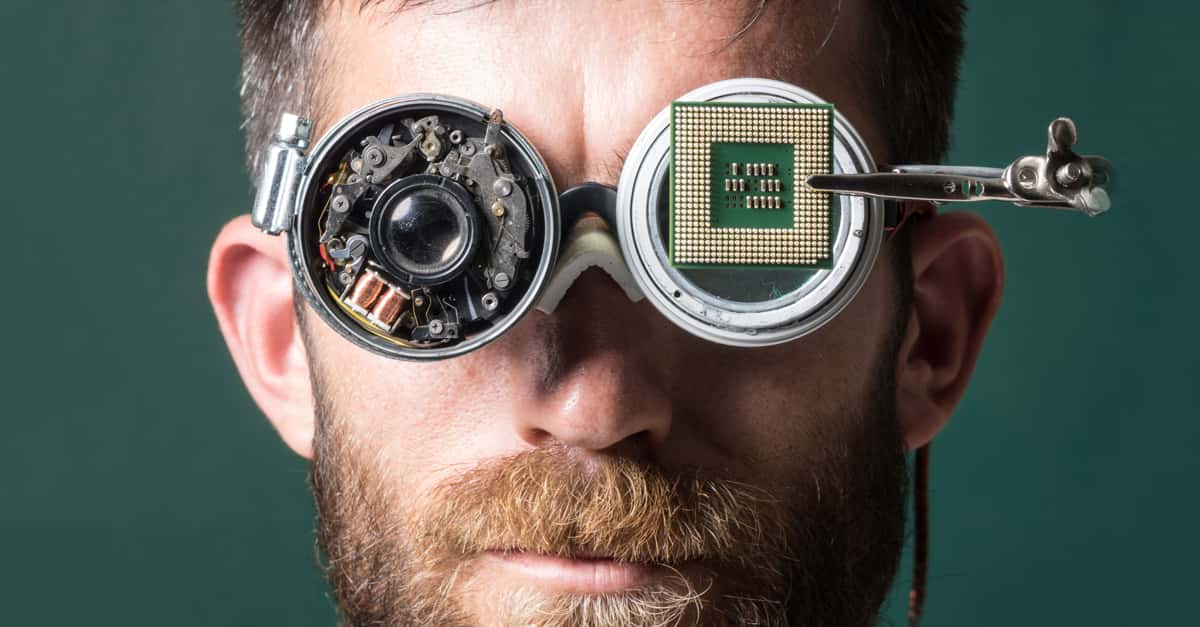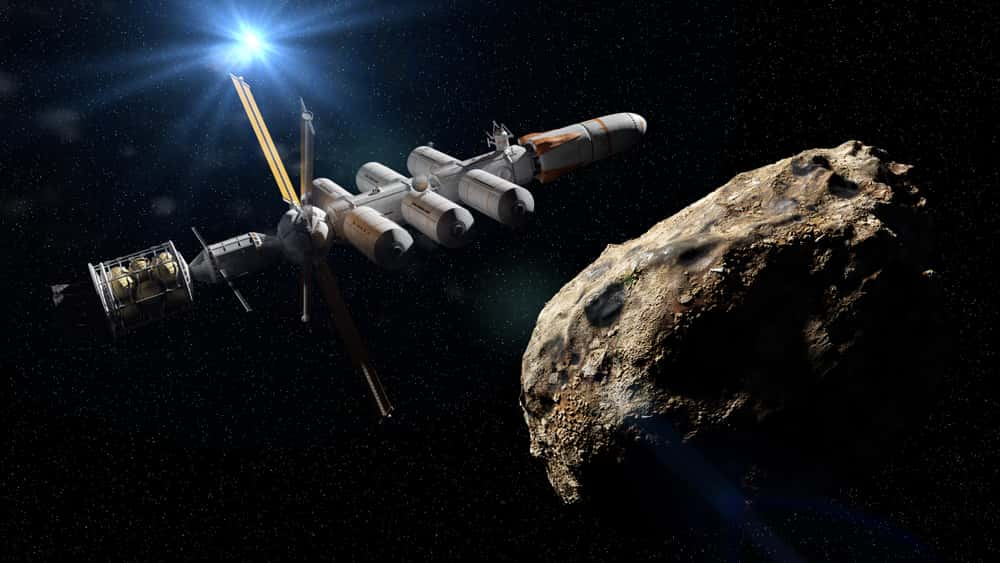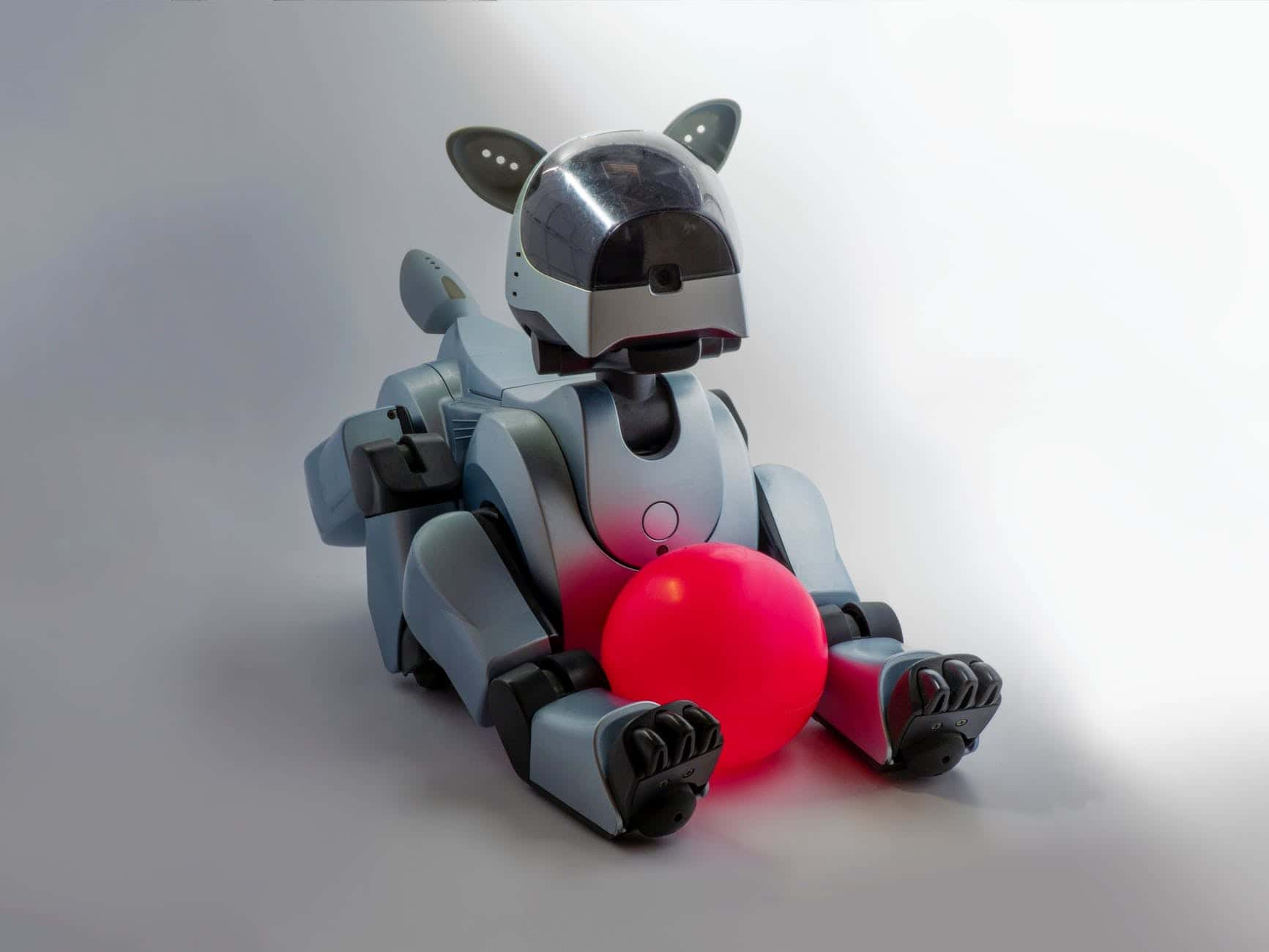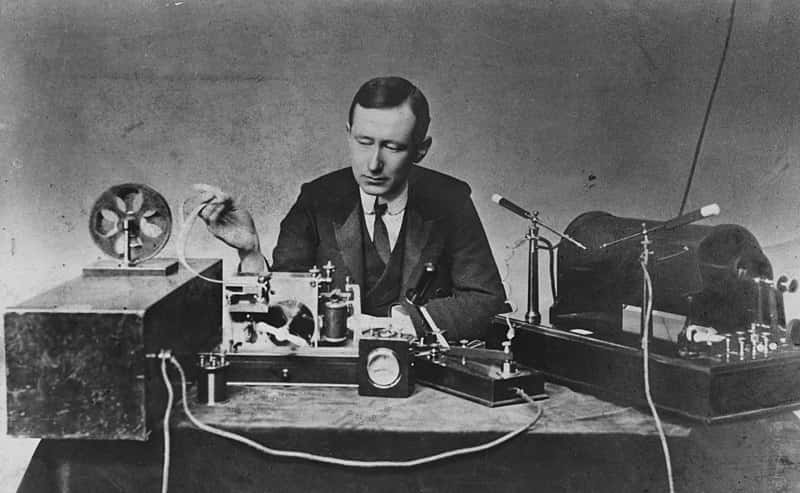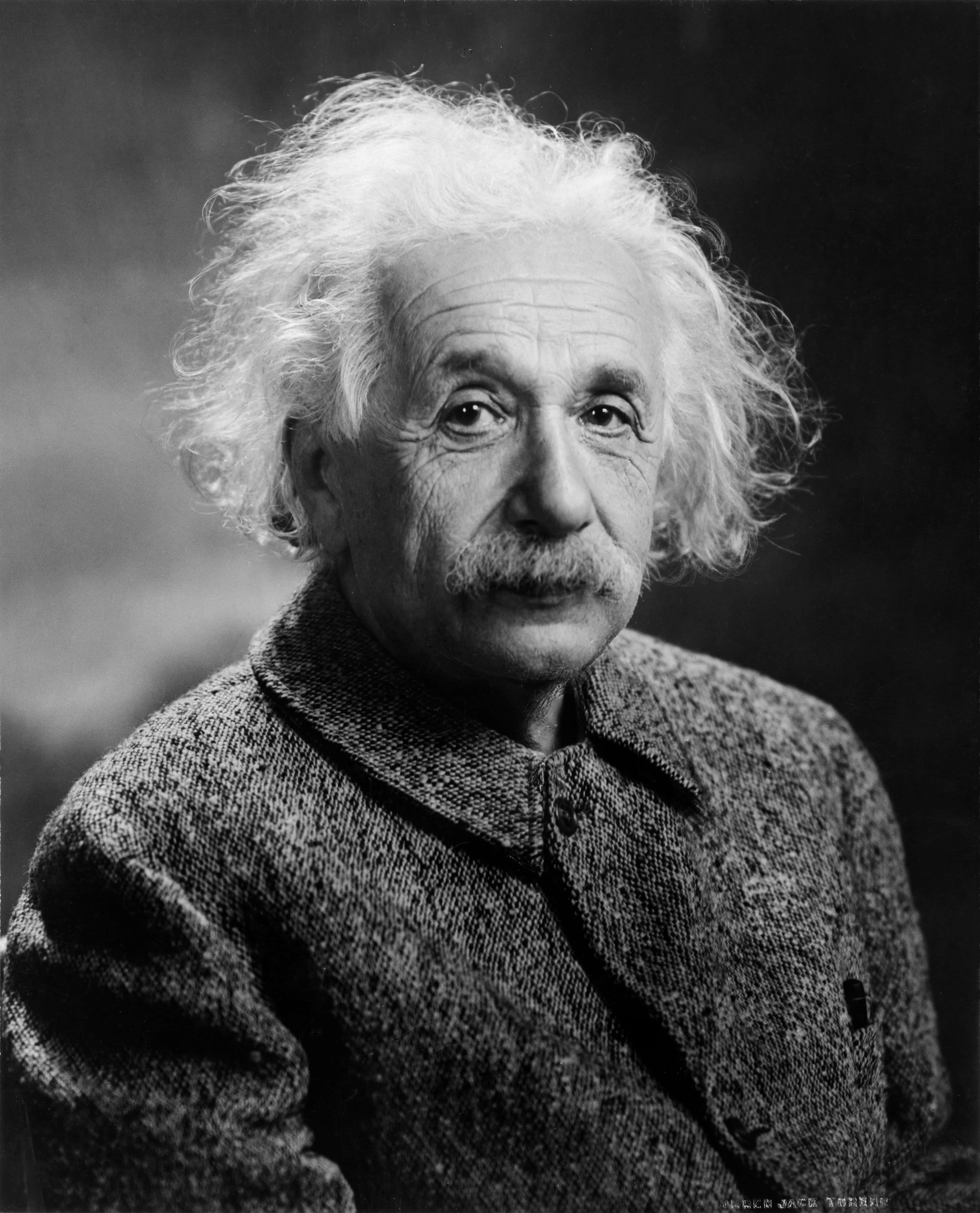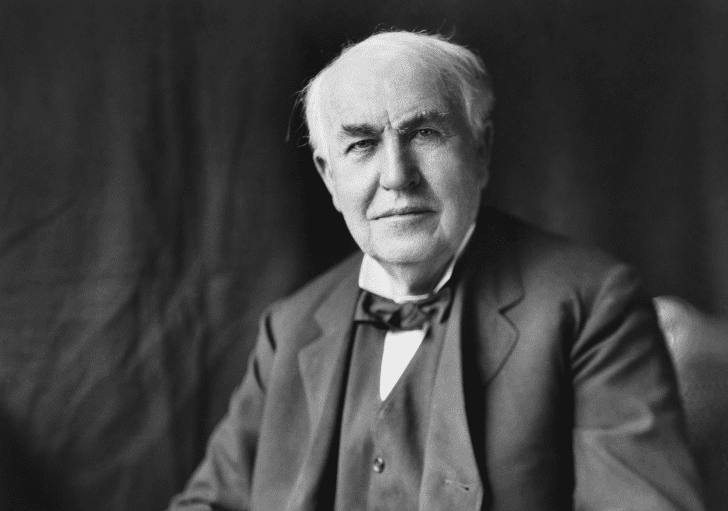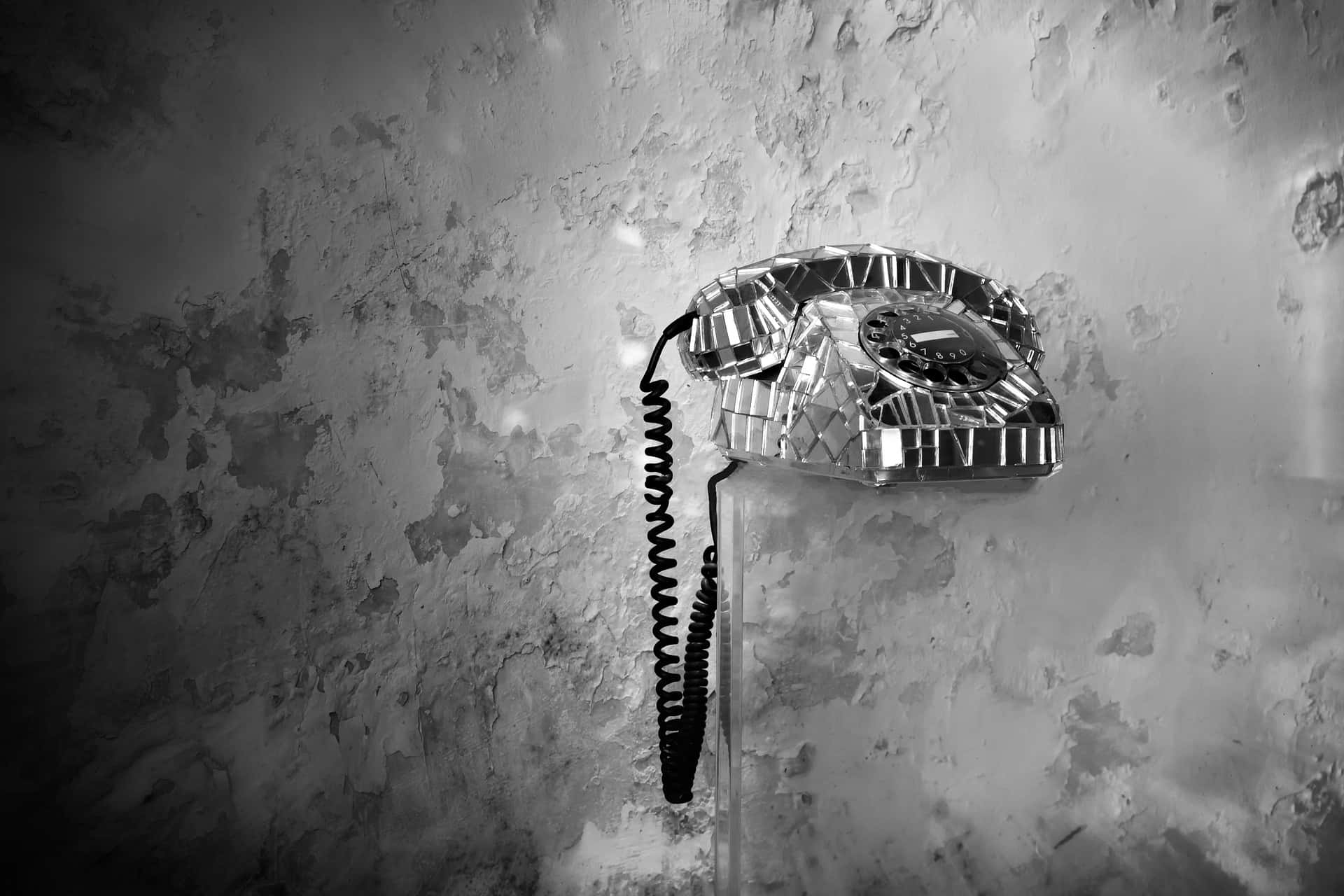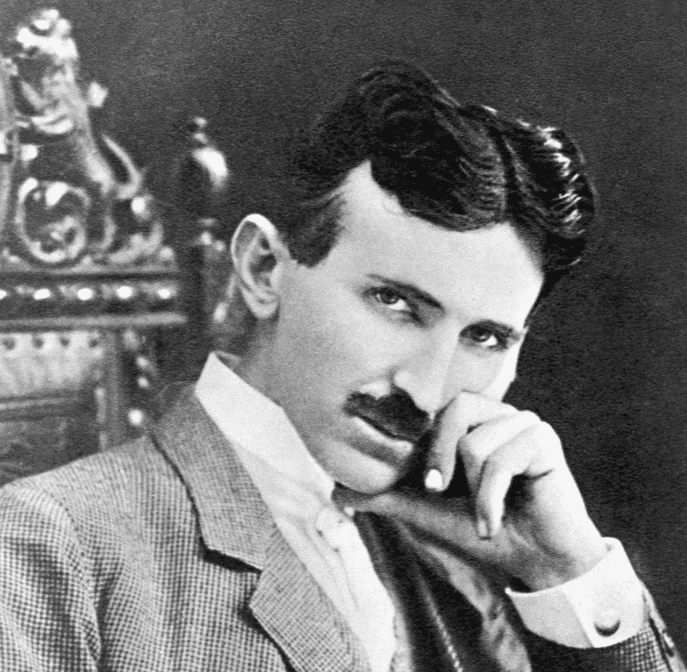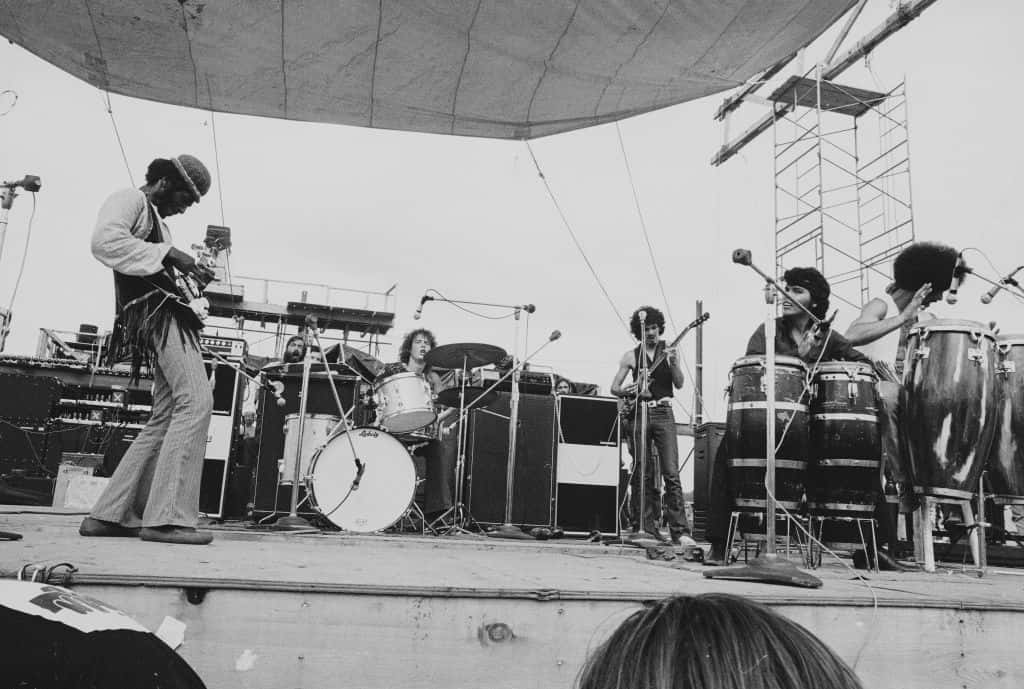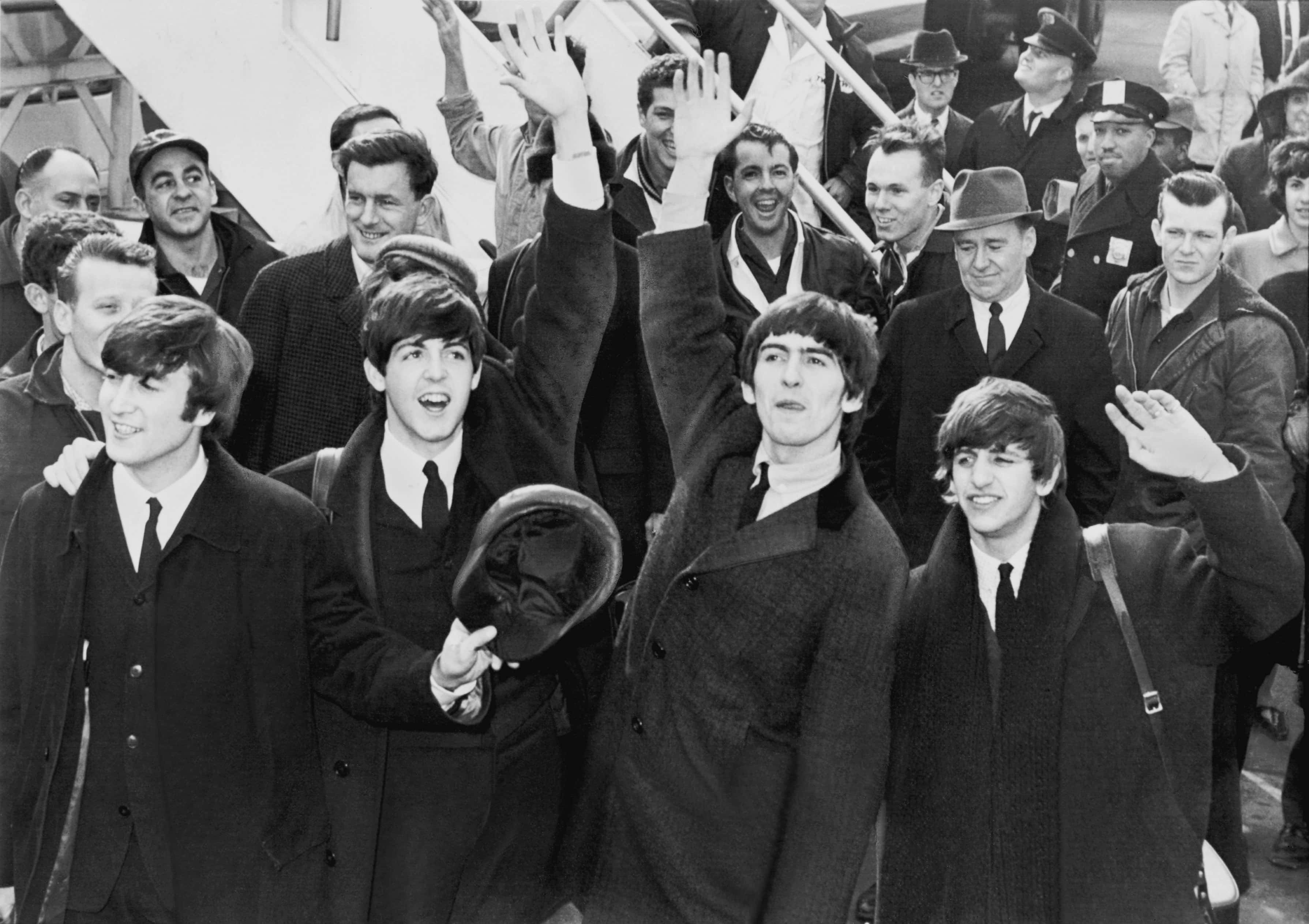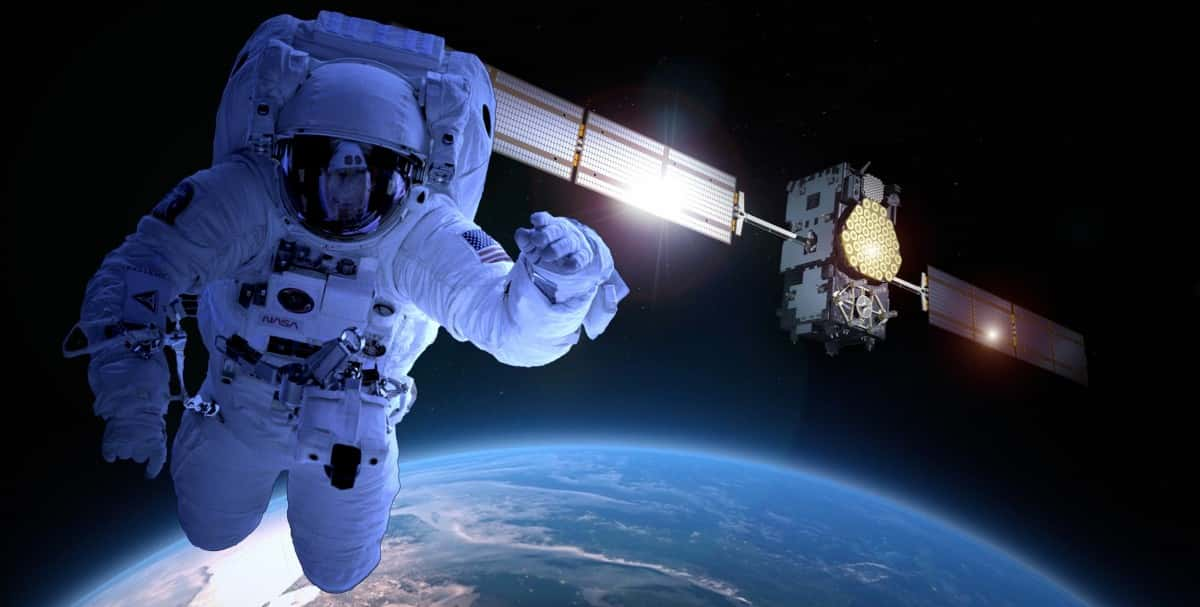“I predict that within 100 years, computers will be twice as powerful, ten thousand times larger, and so expensive that only the 5 richest kings of Europe will own them.”—Professor John Frink, The Simpsons
If there’s one thing people have proved time and time again, it’s that we’re not always the best a predicting the future. Here are 42 examples of some less than accurate predictions about what the world of tomorrow will be like.
1. We Won’t Have to Worry About the Weather Because of Giant Glass Domes
Nothing says the future like enormous glass domes. Closer Than You Think, a Futurist comic strip from the late ‘50s and early ‘60s predicted that all suburban houses would sit under enormous transparent domes that would protect them from bad weather, allowing for lush, green lawns and gardens all year round.
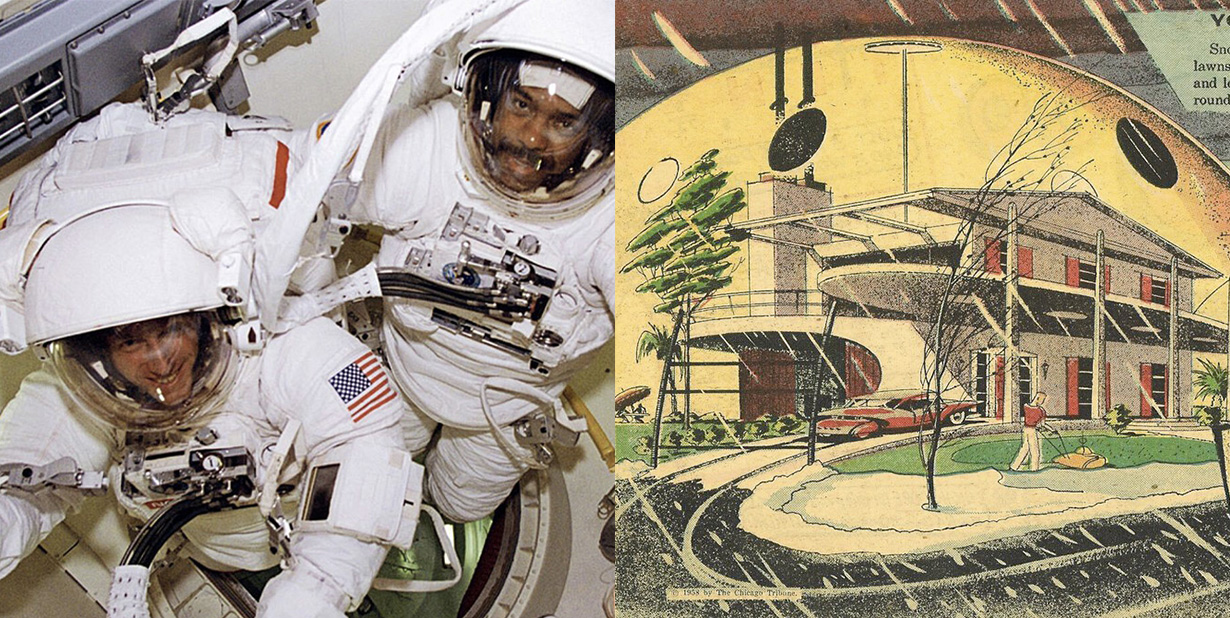
2. The US and Russia Will Be Connected by an Underground Highway
People crossed the Bering Land Bridge between Russia and Alaska during the last Ice Age, but ever since it’s been covered by miles and miles of ocean. In 1959, Closer Than You Think predicted that an enormous, underwater highway would be built to cross the distance, allowing Americans to take their cars, rather than plans or ships, to Asia and Europe.
3. We’ll Colonize Space by the 21st Century
A lot of Western history has been spent finding new frontiers and exploring new lands. But by the 20th century, there were really no more lands to find. It’s not surprising then that in 1959 Closer Than You Think assumed that we would hop on “Space Mayflowers” and begin to colonize space in the not too distant future.
4. The Future’s Media Libraries Will Look… Just Like Old Libraries
In 1959, Closer Than You Think assumed that media libraries would be huge and varied, and that is more or less true today. But they assumed those libraries would look pretty much just like libraries do today, with shelves filled by 3D film reels and futuristic books that could be projected on the ceiling.
5. TV Walls
TVs just keep on getting bigger and bigger, but they haven’t quite reached as big as we thought they would. The hope was that TVs would take up entire walls of every home in the future. Maybe some today do, but I don’t want to know how much they cost.
6. There Will Be Chemical Battle, but It’ll be a Laugh
Some of history’s worst atrocities have involved chemical attacks, but in the ‘50s Closer Than You Think assumed that in the future, it wouldn’t be so bad. They predicted pacifying drug that would make battles non-violent. Just gas the population of wherever you’re invading, and they’ll all be made happy and compliant, allowing you to waltz in with no resistance.
7. Flame Throwing Snow Plows
Snow plow technology has advanced really little in half a century. A large metal plow mounted on the front of a truck is still the method of choice. But the innovating spirit of the 20th century was sure the design could be improved upon, and Closer Than You Think envisioned the futuristic Sno-Melter that had massive flame-throwers mounted on the front to melt snow with ease.
8. Planes Will Launch by Catapult
To this day, airport runways take up a lot of space. To solve this problem, Closer Than You Think predicted that we would use much smaller, circular runways, where special catapult-like devices would be used to launch planes into the air. That never became the norm, but aircraft carriers do launch planes with a similar method today.  Unsplash
Unsplash
9. 24 Hours of Daylight
I guess working with the idea that nighttime is spend time, Closer Than You Think envisioned harnessing the power of electricity the create massive lightning balls in the sky that could simulate daylight 24 hours a day.  ibadat singh, Pexels
ibadat singh, Pexels
10. Hospitals Will Be in Space
As if hospitals aren’t slow enough already, Closer Than You Think assumed that space travel would be so common and efficient that we would build the hospitals of the future in space so that anyone from earth could simply blast up there for medical help.
11. We’ll Have Flying Cars, Fireman, Mailmen, and Officers
A lot of predictions for the future have revolved around flight. At different times, we’ve assumed that the future will have everything from flying firemen to put out fires on skyscrapers, flying mailmen to streamline the service, flying officers to better protect, and of course, flying cars to revolutionize transportation.
12. We’ll Ride Seahorses in Undersea Cities
Famous science fiction author Isaac Asimov predicted that people would live in grand, undersea houses by 2014. That didn’t happen, but it wasn’t too farfetched. Especially compared to a postcard from a series made in Paris in 1899, that predicted people would ride giant seahorses underwater in the year 2000.
13. We’ll Have Whole Orchestras Where the Instruments Are Played By Machines
The same series of postcards from Paris also had a vision of the future of music. It showed an orchestra that looked a lot like a traditional one, except the instruments were all hooked up to a machine that was controlled by a single person at a console in the middle. As far as electronic music goes, this was close but way off.
14. Robot Maids Will Do All Household Chores
The goal of robots has always been to make human lives easier, and people used to believe they’d be really common by the 21st century. A common prediction was that no one would have to do household chores because robot maids would be in every home. That never came to be, but at least we have the Roomba.
 Piqsels
Piqsels
15. We Won’t Need to Brush Our Teeth
People once believed that by 2013, brushing your teeth would be a thing of the past thanks to Denturinse, a kind of mouthwash that would be just as effective at cleaning your teeth. We can always dream…
16. Robot Pets Will Replace Living Pets
Every few years a little robot dog or cat toy hits the market and makes waves around Christmastime before eventually being forgotten. But people used to assume that robot pets would become so convenient and lifelike that no one would bother with the real thing anymore.
17. Computers Will Weigh “Only” 1.5 Tons and Have “Only” 1000 Vacuum Tubes
To their credit, Popular Mechanics did predict the trend of computers growing smaller all the way back in 1949. However, since the only computers they had even known had been gigantic, mechanical contraptions, they assumed futuristic computers would still weigh 1.5 tons and have 1000 vacuum tubes.
18. We’re Going to Live on the Moon
Since long before people ever walked on the moon, we’ve been planning to colonize it. Starting in the 1950s, people have been predicting that moon colonies are within our grasp. We’ve never quite managed it, but we’re still hopeful. George W. Bush predicted a lunar outpost as a part of his space exploration plan, and astronaut Chris Hadfield still thinks we might achieve it during his lifetime. We can always be hopeful, right?
19. Houses Will Take to the Air
Acclaimed science fiction writer Arthur C. Clarke wrote in 1966 that by 2001 there would be no need for houses to remain on the ground. Houses would be completely autonomous, with no need to be hooked up to power or water, and so they would be free to fly around the earth as the owners saw fit.  Melnikov Dmitriy, Shutterstock
Melnikov Dmitriy, Shutterstock
20. We’ll Use Nuclear Powered Vacuums
Nuclear power was all the rage in the fifties. Many people assumed this new, incredible power source was the way of the future. So much so that Alexander Lewyt, the head of the Lewyt Vacuum Company, assumed that we would all be using nuclear-powered vacuum cleaners by the mid-‘60s.
21. The Alphabet Will Only Have 23 Letters
Engineer John Elfreth Hawkins Jr. published a list of predictions in the year 1900. He was honestly quite close about things like cell phones and people growing taller, but he was way off about some things too. For instance, he thought that the letters C, Q and X would be removed from the alphabet, because they’re unnecessary.
22. Strawberries Will be as Big as Apples
Another Watkins prediction, he assumed that we would selectively breed strawberries to the point that they would be as big as apples. GMO scientists sure are trying, but they haven’t quite gotten that far yet.
23. Wireless Technology Will Make Battle Impossible
Guglielmo Marconi was an inventor who helped pioneer long-distance radio transmissions. In 1912, he was asked what this new technology would mean for battle. His response was that it would make battle impossible because if people were better able to communicate, there would be no need for battle. Little did he know…
24. The 80s Are Going To Be All About Hovercraft, Self-Driving Cars, and Pneumatic Trains
David Rorvik, a journalist and science fiction writer wrote in a 1970 issue of Play boy that transportation would be totally revolutionized by the mid-eighties: People would be getting around in automated cars, super high-speed pneumatic trains, and luxury hovercraft. Reality? The best selling car of the 80s was the Ford. Just a little off.
25. Nuclear Power Will Never Happen
Albert Einstein was a smart man, but he didn’t get everything right. In 1932, he stated that “there is not the slightest indication that nuclear energy would ever be attainable. It would mean that the atom would have to be shattered at will.” Just six years later, scientists in Berlin would do just that, and Einstein would write a letter to Franklin Roosevelt to warn him.
26. Telegraphs Will Stay More Useful Than Phones
Western Union used to have a monopoly in the telegraph industry and as such was an enormous player in the world of communications. You might think that when the telephone came to be the company would shift its focus. But instead, in 1876, they said “This 'telephone' has too many shortcomings to be seriously considered as a means of communication. The device is inherently of no value to us."
 Public Domain Pictures
Public Domain Pictures
27. Cars Will Never Replace Horses
Horace Rackham was one of the original investors in Henry Ford’s Ford Motor Company. Before investing, he went to the Michigan Savings Bank to ask for advice. The president of the bank told him “The horse is here to stay but the automobile is only a novelty—a fad.” Thank goodness Rackham didn’t listen to him.
28. There Will Never Be a Plane That Can Carry More Than 10 People
After the first flight of the Boeing 247, an engineer from the company allegedly predicted that there would never be a larger plane built. The 247 could hold 10 people.
29. We’ll Have the Midas Touch
There’s no doubt that Thomas Edison shaped the future, but not in as many ways as he hoped. In 1911, he predicted that the age-old goal of alchemy—to turn materials into gold—would be an “easy matter” for people of the future.
30. Flying Machines Will Never Exist Because They’re Physically Impossible
People have dreamed of flight for all time, but one scientist was ready to throw in the towel in 1888. Writing for Popular Science Monthly, professor Joseph le Conte said: “Is it not demonstrated that a true flying machine, self-raising, self-sustaining, self-propelling, is physically impossible?”
31. The Brits Will Never Use the Telephone
Though he admitted that Americans would use the telephone, British post office engineer William Preece said that the British had no use for the device. The reason? “We have plenty of messenger boys.”
32. We’ll Never Start Using Electric Lights
When advising investors who owned shares in gas lighting in the 1870s, scientist John Henry Pepper told them “Do not bother to sell your gas shares. The electric light has no future.”  Pexels
Pexels
33. It Will be All DC Power, All the Time
The feud between Thomas Edison, the chief proponent of DC power, and Nikola Tesla, the same for AC, has been very well documented. Today, both forms of power are widely used. But Edison was pretty sure of himself, saying “Fooling around with alternating current (AC) is just a waste of time. Nobody will use it, ever” in 1889.
34. The TV Will Disappear Because People Will Get Tired of It
Darryl Zanuck, a film studio executive from 20th Century Fox, wasn’t worried about the rise of television. He said in 1946 that people would “get tired of staring at a plywood box every night.” He’d be proved wrong, and to put salt on the wound, Fox would of course eventually start their own television empire.
35. There Will Be No More Rock and Roll After June 1955
The fifties saw the birth of rock and roll music, but not everyone knew where it was headed. In 1955, Variety Magazine said this about rock ‘n’ roll: “It will be gone by June.” Maybe they meant June 2055?
36. Guitar Music Is on the Way Out (In 1962)
Have you heard of Decca Records? Most people haven’t, but they were given a chance to sign the Beatles in the early sixties. They passed on the band, saying “We don’t like their sound, and guitar music is on the way out.”
37. We Won’t Be Using Satellites for Communication
The head of the FCC (Federal Communications Commission) said in 1961 that “there is practically no chance communications space satellites will be used to provide better telephone, telegraph, television or radio service inside the United States.” Today, satellites do all of that.
38. Arcades Will be as Fancy as Casinos
The early 1980s had a huge video game boom, and people in the industry had very high hopes for where the medium was headed. This was a time where household consoles couldn’t hold a candle to full-sized arcade games, and it was assumed that trend would continue. So in 1984 TV Gamer Magazine predicted that arcades would become massive, futuristic purpose built complexes. Instead, they disappeared almost completely.
39. Video Games Will Be Beamed Into Your Head
We’re just now starting to crack into virtual reality gaming, but the same TV Gamer Magazine article assumed that by the nineties, not only would we have VR, but that games would be beamed directly into gamers’ heads. No more holding a controller or watching a screen, players would be literally in the game.
40. No More Internet After 1996
For being one of the inventors of Ethernet, Robert Metcalfe didn’t have much faith in the internet. In fact, he famously predicted in a magazine article that the entire things would “go spectacularly supernova and in 1996 catastrophically collapse.” Years after this infamous quote, he literally ate his words: On stage in front of an audience, he blended up a copy of the article with water and drank it. He was wrong, but at least he was a good sport about it.  Shutterstock
Shutterstock
41. Apple Computers Will Be Gone by 2000
Right around the time that Steve Jobs returned to Apple in 1997, most people in the tech world thought that the company was headed in to history. The Economist, The New York Times, Business Week, as well as high ranking people from Microsoft and Dell all predicted that Apple Computers was a soon-to-be dinosaur. Then, just a few years later, the iPhone came out…
42. The iPhone Will be a Failure
You would think that creation of the iPhone would have worried top executives at Microsoft. On the contrary, the CEO Steve Ballmer said: “There’s no chance that the iPhone is going to get any significant market share.” The iPhone did just that, on top of completely changing the world we live in.
Sources: 1, 2, 3, 4, 5, 6, 7, 8, 9, 10, 11, 12, 13, 14, 15, 16, 17, 18, 19, 20, 21, 22, 23, 24, 25ussubstructures

